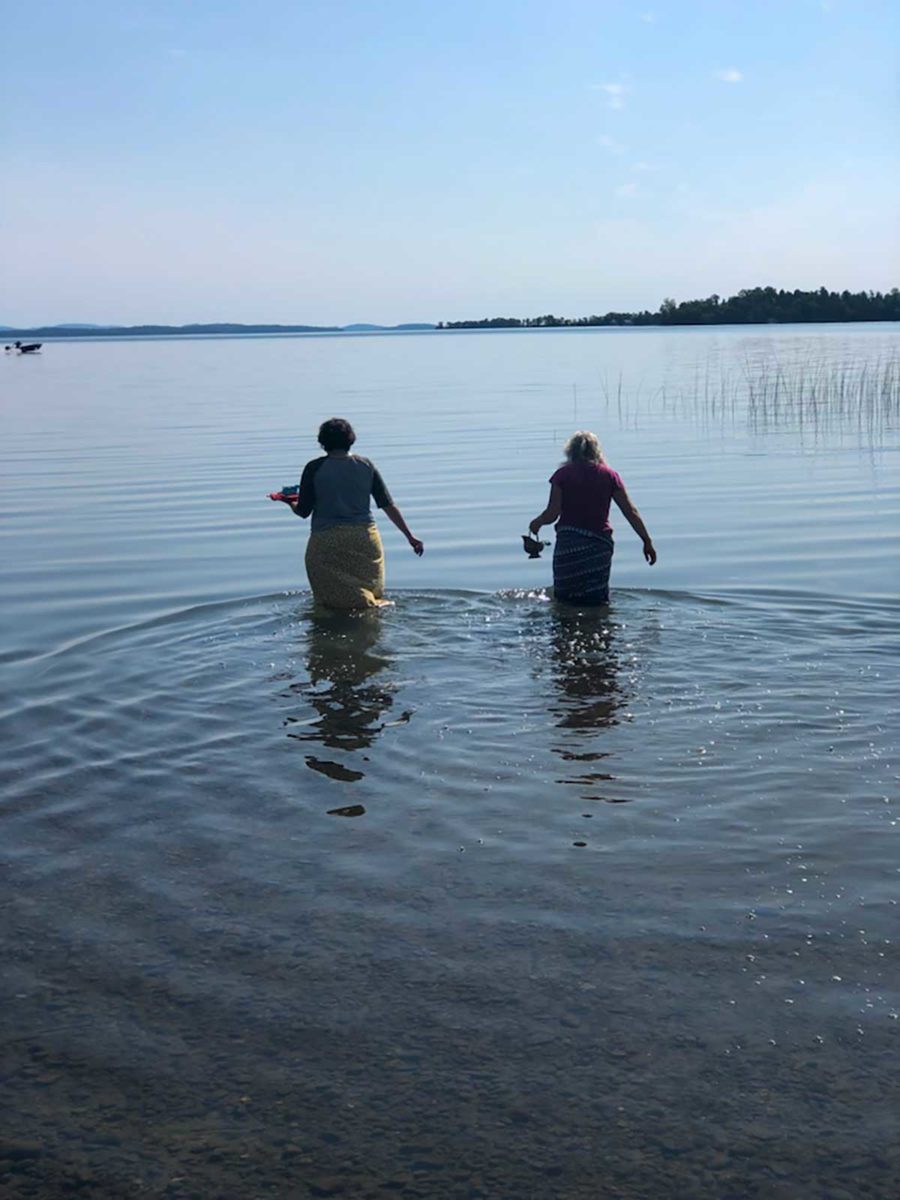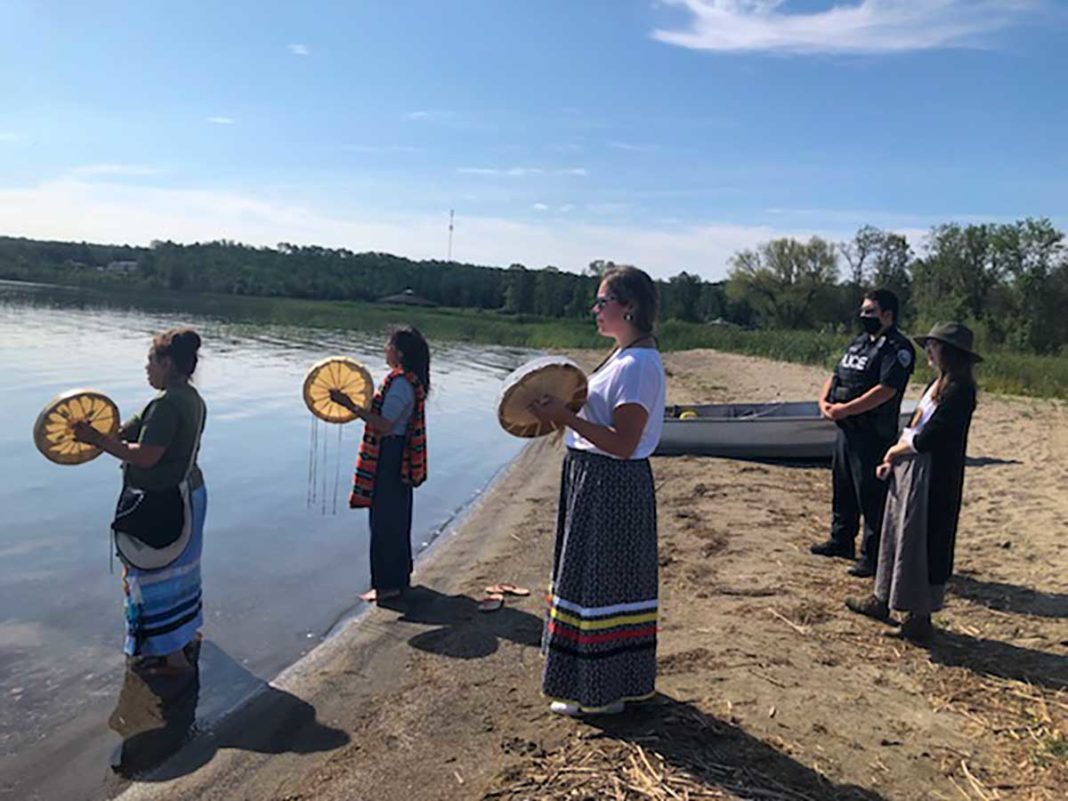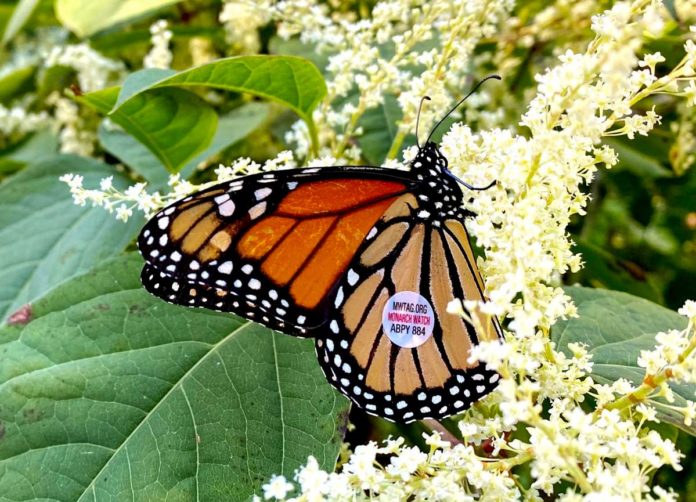SHEGUIANDAH – As the sun rose above the horizon on Sheguiandah Bay a group of 10 water walkers gathered with traditional healer Jake Ago Neh and walk organizers Shelba Deer, community wellness worker program co-ordinator at the Sheguiandah First Nation Health Centre Shelba and volunteer Crystal Madahbee to begin Sheguiandah First Nations’ very first water walk.
Ms. Deer noted that the idea for the walk first germinated some time ago, but the intervention of the pandemic put plans on hold. Things have recently come together, however, allowing for the walk to finally talk place.
Elder Ago Neh performed a sunrise ceremony before two women stepped up to their waists in the water to fill a copper kettle with the precious fluid.
“People have forgotten how sacred water is,” said Mr. Ago Neh, who said he hoped the water walk would serve to help re-awaken the spiritual connection between the community and water’s lifegiving spirit. “Your body and the earth are made up of two-thirds water,” he said. “You can’t have life without water.” And yet, humanity has come to disrespect water. “We stand there and let the water run out of the tap for five minutes,” said Mr. Ago Neh. “It isn’t going to get any colder after a few seconds, but we just let it run away.” Pollution has also become a serious concern when it comes to water.
Mr. Ago Neh invoked the memory of the late water walker Josephine Mandamin, whose circumnavigation of the Great Lakes not only brought awareness to the world’s largest bodies of fresh water, but inspired numerous communities to take on their own water walks. Ms. Mandamin’s niece Autumn Peltier has taken up the mantle of water walker from her late aunt and is now the Anishinabek Nation’s official water commissionor.
Ms. Deer explained that water walks normally take place in either the spring, when the water is renewed, or in the fall, as water begins to settle into its winter hibernation beneath the ice, but the community decided to go ahead with the walk.
Ms. Deer began the water walk by providing water teachings in the waterfront area by the Sheguiandah powwow grounds. She has been undertaking water teachings for the past four years.

A group of women hand drummers sang an honour song to the water as it was being gathered for its journey through the streets of Sheguiandah First Nation while a floating water plate bore food offerings to the water spirits.
The ceremonies began around 5 am, but the walk itself got underway around 9:11 am, with an escort provided by the UCCM Tribal Police Service as the group made its way through the streets of the community.
Many residents came out of their homes to greet and encourage the water walkers as they made their way along the streets.
“We had to approach this in a careful way due to COVID-19,” said Ms. Madahbee. “We would like to have had a larger group with more of the community taking part.” Future years will see a larger gathering of community members.
Kim Debassige, who teaches at Queens University, and her partner Steven Pruchnicki provided assistance garnered through their many previous water walks in M’Chigeeng.
The women and men attending the walk created medicine bundles that included small rocks (the grandmothers, those stones used in sweat lodges are referred to as grandfathers) and usually contain small portions of traditional foods including fish, corn and strawberries.
Elder Ago Neh said he believes that many of the issues facing Indigenous communities these days stem from the loss of their traditions and culture, their innate spirituality having been supplanted by the alien teachings of Christian missionaries and instilled by the residential school system.
“People have lost their identity,” he said, referencing Indigenous peoples generally. “They wander lost and fall into drugs and alcohol to try and fill that gap.” But those crutches do not fill the hole left by that loss of identity and only lead to self-harm.
It is hoped by the organizers and participants that ceremonies such as the water walk will help re-ignite Anishinaabe identity and lead to a sustainable recovery of traditional ways.
Funding for the program was provided by the Anishinabek Nation (Union of Ontario Indians) through the Indigenous Healing and Wellness Strategy program.





